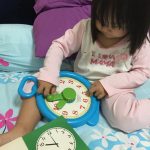I spent some time reconnecting with my little preschooler who hasn’t seen me last 4 days because of my intense training program. What she said broke my heart.
A said, “Teacher Vanee has left. She went to another school. K1 (Kindergarten 1st year) is too boring, and the naughty boy doesn’t listen.”
I was taken aback by her comment so I asked her what made her think that’s why the teacher had left.
“That’s what Teacher Vanee said to us. She said she is leaving because K1 is too boring and the naughty boy doesn’t listen,” she explained.
So many alarms screamed at me that, for a moment, I didn’t know how to react. After a deep breath and a pause, I decided to begin with the “naughty” boy. I know exactly which boy A is referring to because she has spoken of him often. The boy who can’t sit still. The boy who is rough. The boy who hits. The boy who shouts at his classmates. Basically, the boy whom the teacher calls “naughty boy”.
The “Naughty” Boy
This little boy, Z, is brought to and from school every morning by his grandmother. It is obvious his grandmother loves him because I have seen her hug him occasionally when he cries while waiting in line for the classroom door to open. But more often, I hear her abusing him verbally, calling him names. I have seen her lift her hand to him and he flinched (a sign he has been frequently hit). I have even seen, from a distance, her hitting him. The one time I intervened was when we were walking to school and they were right in front of us. She had scolded him, “You are so naughty. Nobody likes you. Even your teacher doesn’t like you.” When the boy attempted to hug her, she shoved him away. “I also don’t like you,” she responded in disgust.
Here was a small little 5-year-old being verbally hurt by his caregiver, someone whom he loves. And when he sought some comfort from her, she had shoved him off with a hurtful comment laced with repulsion. That tore my heart and I asked her why she spoke to him that way. We had a little conversation and she justified her own behaviour.
It’s hard to teach someone who doesn’t want to learn. So I ended with “He is just a kid and he needs love.” Ever since, that grandmother has made sure she keeps a distance from me when sending her grandson to school.
I have, on many occasions, asked A to stop calling or referring to Z as “naughty boy”. But I understand it’s hard for her do so because that’s what she hears everyday in school. So after A’s comment about why her teacher was leaving, I asked A to stop calling Z “naughty”. I explained that he behaved the way he did because he had not been taught correctly how to behave. He may have been taught how to behave, but because he is not taught properly, he still hasn’t learned.
His Mistake Was Mirroring
I explained to A that the reason she doesn’t shout at or hit her friends at school is because she is taught that yelling and hitting other people is wrong. Not only is she taught that those behaviour is not acceptable, she also doesn’t see anyone at home yelling or hitting. What she experiences at home is the same as what she is taught. So she learns.
But for Z, it is different. Yes, he is definitely taught not to shout at or hit his friends. Umpteen times. But he is being shouted at and hit, not only at home, but in public as well. So he is confused. He doesn’t understand why he can’t do what his grandmother (and perhaps other members in the household) does. And when he is confused, he just mirrors the behaviour he always sees, which is shouting at and hitting people.
The Boy Needs Love
I also told A that Z needs a lot of love. I told her if Z is nasty to her, she can protect herself by walking away and telling the teacher. But before she does that, she needs to tell Z, “My mom says you need love and I need to be kind to you. But it doesn’t mean you can shout at/hit me.” A nodded her head and she repeated the sentence several times. With each repetition, her eyes teared more.
I asked her if she felt sad for Z and she said yes. She also said Z was sad that Teacher Vanee was leaving.
I explained that he is sad because he loves Teacher Vanee. And he is sad because he believes it is he who drove Teacher Vanee away. I told A that my heart breaks for Z.
Why The Teacher Left
Next I told A that Teacher Vanee did not leave because school was boring or that Z was naughty. Teacher Vanee could have left because she found a school that gives her more money, or she found a school which is more enjoyable for her, or she found a school closer to her home.
“No GOOD teacher would leave simply because one child does not listen. A GOOD teacher will do everything in her power to help the child, to teach the child. And no GOOD teacher will leave because school is boring. A GOOD teacher will MAKE her class and lessons fun.” In fact, I told her I am glad Teacher Vanee has left because I have long felt she is not a suitable teacher for preschoolers. I am glad she found another job which suits her better and I hope she is not teaching preschoolers.
Impact on the Children
My heart remained heavy for the day. I feel sorry that Z will live under the guilt of chasing his teacher away. I feel sorry for her students who now will see their K1 life as boring (because their teacher had said so).
I am glad Teacher Vanee has left my daughter’s school, but I dread the impact she would have on her new students.
– Vivian Kwek –








